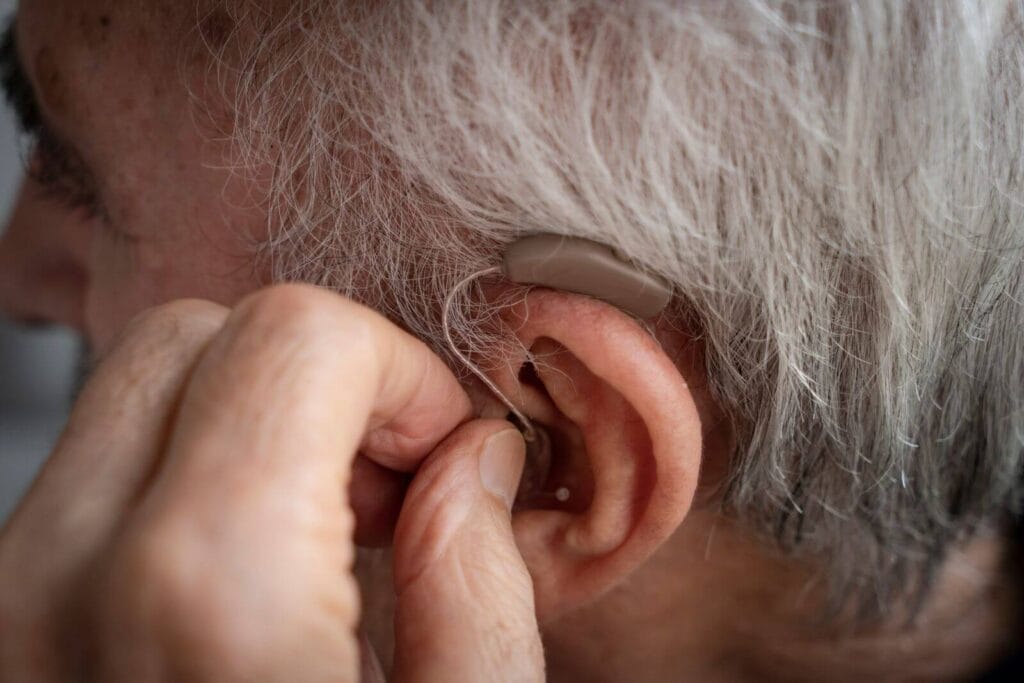
When a senior has untreated hearing loss, family members may be worried about their older adult loved one’s well-being and ability to connect with others. However, many older adults resist getting hearing aids regardless of their many benefits. It’s important to remember that your loved one has valid concerns. Rather than arguing with them, work with the deeper emotions that drive their resistance. With the right approach, you may be able to change their mind. Here, we explore five common concerns older adults may have about hearing aids and offer advice on how to handle them.
They fear social stigma
Many people associate hearing loss with getting older and becoming frail. Your loved one may be afraid of how other people will view them if they wear hearing aids. It may be tempting to point out that frequent difficulties with communication are far more obvious to people around them than hearing aids or to argue that no one will notice or care (even if that is true).
A more effective strategy, however, would be to acknowledge and accept the senior’s fears and offer suggestions that might ease their concerns. Let them know you understand that it’s hard to get older and experience hearing difficulties. Acknowledge that it can be difficult to seem different from others and rely on assistive technology that they feel may make them look “old.”
Ask if they’d like to explore less visible hearing aid models. Many audiologists have demonstration models in their offices where your loved one can see what they will look like. They may be surprised at how small some models are.
They think hearing aids will not help
Your senior loved one may think they will be getting the hearing aids they remember from the past with outdated technology. These devices had little noise reduction and poor feedback management, which made them less effective or even irritating to use. Today’s sophisticated sound processing and feedback management technology provides a greater potential for a positive experience.
Look for an experienced audiologist who performs real-ear measurements. This process provides the most precise fitting and gives the best chance of a successful outcome. With a precise fitting, your loved one may better perceive how helpful hearing aids can be.
You can also call to see if the audiologist will perform a trial fit of demonstration hearing aids and test your loved one’s hearing with and without them. Frame this visit to the audiologist as a trial, not a final decision. They may notice a significant benefit to using hearing aids and become more open-minded about the decision.
Find the Best Hearing Aids For You!
They have anxiety about hearing aid operation and upkeep
Some seniors worry that their dexterity will give them problems with inserting and removing their hearing aids, operating the buttons, and cleaning the devices.
Modern hearing aids offer various ways to overcome dexterity concerns. Many models can be adjusted from smartphones, eliminating the need to fuss with tiny buttons. Some also adjust automatically without any changes made by the user.
Still, you should validate your loved one’s concerns with empathy. Ask what they think might help them manage their hearing aids. Perhaps a family member could provide extra support with putting them in or offer to clean them once a week.
They’re concerned about the cost of hearing aids
Hearing aids are a significant investment not often covered by health insurance. However, today’s marketplace offers a variety of options and price points, including over-the-counter options that can be less expensive.
Although cost is a significant concern, perceived value can be more important. Focus your conversation on how your loved one might benefit from better hearing, not on the details of device costs. Acknowledge that hearing aids can be expensive, and ask them what benefits they would want to see from the devices to make the cost worth it.
They believe their hearing isn’t that bad
Hearing loss in seniors usually comes on gradually. Your loved one may be retired and less active. They may not face as many demanding communication situations as younger people who still attend work meetings and frequently go out with friends.
Your loved one can get a hearing test from an audiologist for an objective measure of hearing acuity, but typically, the resulting audiogram is abstract and not particularly meaningful to people. A good audiologist will, in their counseling, translate the test results into easy-to-understand terms. You can also plot the audiogram on a common sounds chart to see which sounds your loved one can and cannot hear, giving them a clearer understanding of the degree of their hearing loss.
Ask them what problems they have been noticing in their hearing, and ask if those are issues they would like to improve. You might offer gentle observations of difficulties you have noticed. Sometimes, a good first step if they aren’t yet ready for hearing aids is to get TV Ears, wireless headsets that connect to the television and operate separately from the TV’s volume controls. They may notice that they help, which can lead to a more open mind about how hearing aids may benefit them.
Final thoughts on talking to your loved one about hearing aids
Overcoming objections to hearing aids in older adults is not easy. The key is to approach seniors with respect, empathy, curiosity, and open-ended questions that help them arrive at their own solutions rather than telling them what to do. Most of all, be patient. You may need to have several conversations, but with the right approach, you can help your older adult loved one realize the benefits of using hearing aids.








